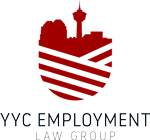Employment Law vs. Labour Law – What’s the Difference?
Employment Lawyers Calgary Explains. If you look up synonyms for “employment,” a few different words will pop up: livelihood, profession, trade, and labour. Just to name a few. But, when it comes to the terms “employment law” and “labour law,” these areas of practice are quite distinct. The most significant difference between these two really comes down to numbers and the specific way employment rights are dealt with and enforced procedurally. Simply put, employment law deals with the rights of individuals, whereas labour law deals with groups of employees and the collective, through forums such as trade unions.
If you look up synonyms for “employment,” a few different words will pop up: livelihood, profession, trade, and labour. Just to name a few.
But, when it comes to the terms “employment law” and “labour law,” these areas of practice are quite distinct.
The most significant difference between these two really comes down to numbers and the specific way employment rights are dealt with and enforced procedurally. Simply put, employment law deals with the rights of individuals, whereas labour law deals with groups of employees and the collective, through forums such as trade unions.
Generally speaking, employment law is more applicable for the majority of Calgarians, as most of us are non-unionized employees. Here in Canada, approximately 6% of the population would fall under the labour law legislation (be it federally or provincially) and require specific representation between their collective trade unions and their employers. That number is likely even smaller here in Calgary and generally relates to government workers, whether federal, provincial or municipal.
At YYC Employment Law Group, we usually represent non-unionized employees. However, and as needed, we also assist unionized employees in their dealings with union representatives to ensure their rights are being appropriately addressed and enforced. We are committed to helping Calgary-based employees of whatever stripe fight for justice in the workplace and are here to support you if you require legal counsel in any workplace-related legal matter.
Read on to learn why employment law and labour law are not the same thing and why it matters.
Employment Law: A focus on the employee/employer relationship
Employment law is unique in that it focuses on the relationship between the individual employee and their employer. Employment lawyers often deal with the terms, conditions and agreements entered into between these two parties as outlined in employment contracts.
Some of the more common situations addressed by employment lawyers include:
- Harassment, bullying and discrimination
- Human Rights
- Non-Competition/Non-Solicitation/Non-disclosure agreements
- Occupational Health and Safety
- Wrongful Dismissal and termination
- Employment Standards Code Entitlements and violations
- Constructive dismissal and breach of contract
- Severance reviews and entitlements
- Termination for just cause assessments
- Disciplinary matters
- Employment contract drafting, review and interpretation
But it’s not just the fine print on contracts that employment lawyers review; there are also standards that employers must maintain in the workplace (i.e. payment wages, holiday and vacation pay, termination, leaves of absence, just to name a few) , and all of these are outlined in Alberta’s Employment Standards Code. If an employer fails to abide by these statutory requirements and regulations, their employees would be justified in seeking legal counsel.
As mentioned, the rules regarding minimum wage, statutory holidays, overtime, and deductions are all part of this Code, and the Province is specific about how employers must respect this legislation and comply with their obligations A lot of our time is spent ensuring that the statutory obligations of the employer under the Code are being complied with. To this end, the “common law” (i.e. judge made law in the courts) is also applicable and relates to the rights of employees vis-à-vis the employer; we’re constantly assessing the case law developments in the Alberta courts as they relate to your employment rights and these typically differ from province-to-province.
Labour Law: Protecting the rights and obligations of employees via collective bargaining
As mentioned earlier, about 6% of Canadian employees are part of a union (even less in Calgary), and therefore would fall under either federal or provincial labour legislation and the collective agreements between their unions and the employers. This makes up for about 900,000 employees working for approximately 18,000 employers. These collective groups of employees have their own unique set of labour standards, as defined by the Canada Labour Code for federally regulated private sector employees and the Labour Relations Code (Alberta) for provincially regulated private sector employees.
The Canada Labour Code and collective agreements thereunder help control strikes, lockouts, disputes and other workplace-related matters that affect groups of employees from a specific pool of industries in the private sector. This area of law also helps resolve concerns between unions and their employee-members, ensuring that employees can communicate effectively with their employers, co-workers and union representatives.
What unionized employees are federally regulated versus provincially? Federally regulated industries under the Canada Labour Code generally include businesses such as, among others:
- Banks
- Air Transportation
- Radio and Television Broadcasting
- Railway and Road Transportation
- Mining
In addition, federal public sector employees likewise fall under federal labour laws. However, rather than the Canada Labour Code, they are covered by the Federal Public Sector Labour Relations Act, save for a few exceptions including, among others, management employees.
Provincially, although the number of unionized employees is small relative to non-unionized employees, the number of public sector employees falling under the provincial Public Service Labour Relations Act is quite large (i.e. Alberta Health Services, Alberta Justice, City of Calgary, etc.), again typically with carve-outs for management level employees. In the private sector, we also see a decent number of employees employed in the trades falling under the provincial Labour Relations Code.
The Distinction: Why it matters
If you’re an employee with a claim against your employer, the first step is to determine where to look for recourse: the private law of contract and employee-focused legislation designed for individual non-unionized employees or the laws designed for unionized employees (federal or provincial, private or public sector) and the terms of the collective agreement.
If you fall under the latter category, your first step is to contact your union representative. You will need to file a grievance against your employer under the collective agreement with the assistance of your union. But what if your union is of no help to you? We see this occur more often than it should… some union reps are indifferent (*ahem “lazy”* ) – if this happens, we can assist you in making a complaint against your union to the Alberta Labour Relations Board or the Public Sector Labour Relations and Employment Board, as the case may be. Whether federal or provincial, private or public, your union has a duty of fair representation, which means they must assist you in good faith with your grievance; they cannot act arbitrarily or discriminatorily. If the union is of no help, is incompetently handling your grievance, or decides not to assist you at all with your grievance, we want to know about it. We’ll ensure they act in your best interest, and if they don’t, we’ll bring a complaint against them and force them to do so if it’s appropriate.
If your grievance was properly attended to but it was dismissed by the arbitrator and you need to appeal it, our dedicated employment lawyers can assist you with this, too.
The key take away here is: whether you’re a non-unionized or unionized employee, your legal rights, entitlements and specific procedures to follow will differ. Unlike in private, non-unionized employment disputes, your right to sue your employer in court is extinguished (except for later, on an application for judicial review of an arbitrator’s decision in certain circumstances, but you know what we mean). You’ll have to follow the specific procedures set out in your collective agreement to enforce your rights as an employee. This does not mean you are without recourse or cannot consult an employment lawyer. We can help.
Remember: when you have a workplace-related legal issue, we want to know about it.
Ask yourself these questions, or ask us:
- Am I unionized?
- If so, am I federally or provincially regulated?
- Am I covered by public or private sector labour legislation?
- Is my union rep acting in good faith and taking my grievance concerns seriously?
Both employment and labour law are important areas of legal practice. Our dedicated Calgary-based employment lawyers practicing exclusively in his area of law help to balance the inequality in bargaining power between you and your employer, make sure you’re protected you and that justice is done in industries that we rely on heavily in our day to day lives.
Find a 100% employee-focused Calgary law firm
Are you a non-unionized or unionized employee who is facing a workplace-related legal issue? Do you suspect you are being mistreated at the hands of your employer or your union?
If so, we urge you to seek the guidance of an employment lawyer. We are here to help you protect your rights and fight for justice in the workplace.
We understand that pursuing legal action can feel overwhelming, but our team has deep experience in a wide variety of employment cases, and we are here to support you.
Our 100% client-focused approach at our employment firm means that we only represent the employee. With empathy, compassion, and a clear understanding of Calgary’s unique workforce, we do things differently.
Connect with one of our employment lawyers. At YYC Employment Law Group, we are here for you. Any time, any employment issue, and any workplace.
Don’t settle for less.
A New Era of Calgary Employment Lawyers. We’re Different.

